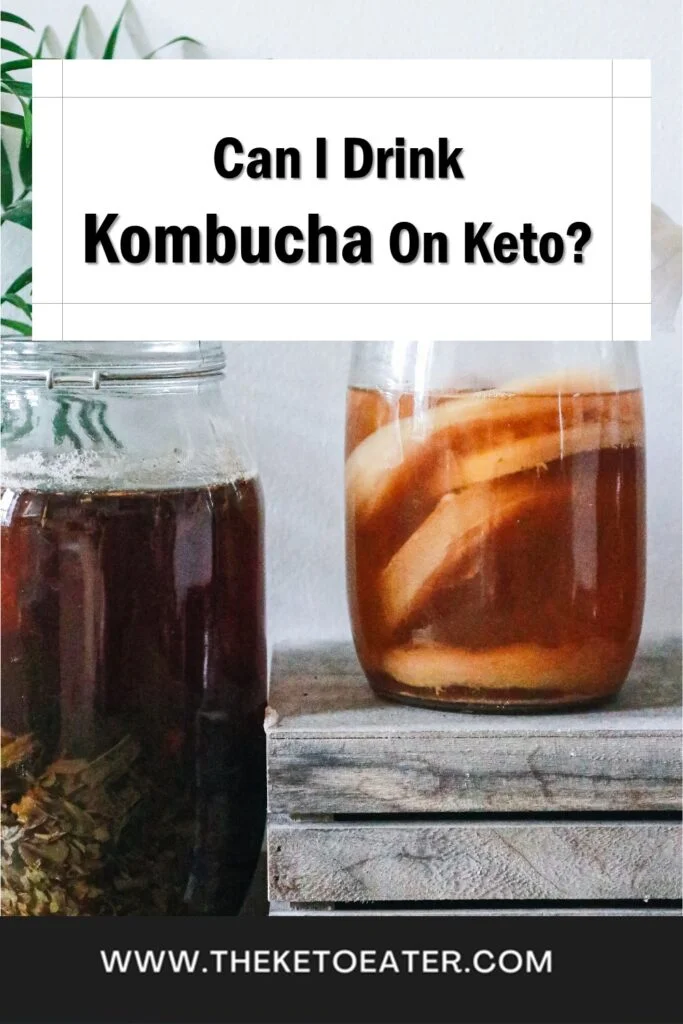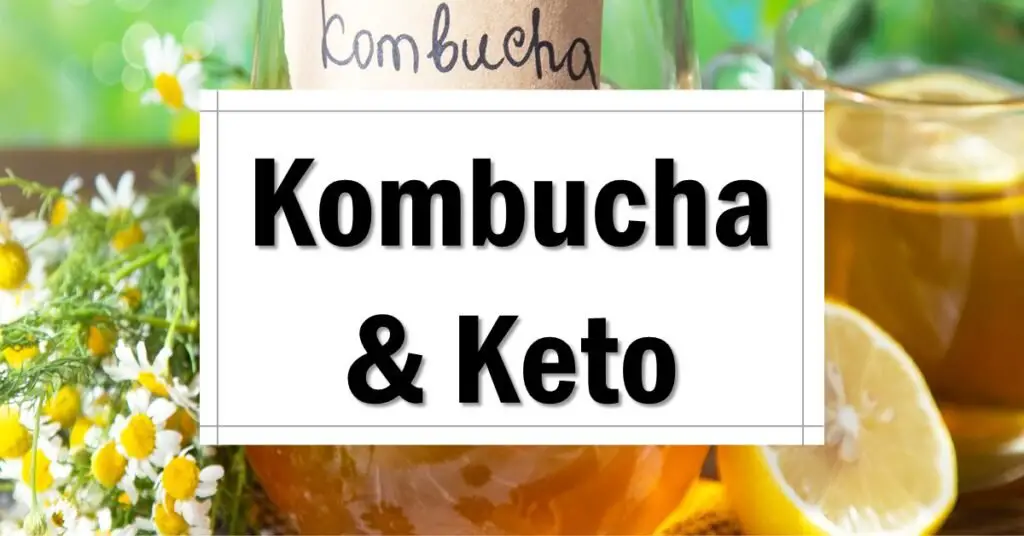SPOILER ALERT: Kombucha is not keto. Sorry to burst that bubble, however, we have come across some perfect hacks to make your kombucha as keto as possible. Read on to find out our top tips to enjoy your favorite drink without kicking yourself out of ketosis. Life without kombucha is that even living?!
Disclosure: Some of the links in this article may be affiliate links, meaning that we may earn a small commission if you click through using our link and make a purchase. Please be assured that this will not cost you any extra money. Also, please be assured that we either use the products we recommend personally, or have been recommended by trusted friends who currently use them.
If you are asking the question of whether you can still drink kombucha on a keto diet, you are probably already a kombucha fan.
However, just in case you are new to the world of kombucha, we will do a quick recap as to what kombucha is and then we will look at whether it is suitable for a keto diet.
So What Is Kombucha?
Let’s start off with how to pronounce this,
kômˈbo͞oCHə
If you’re living in the US, you can buy kombucha everywhere, however, if you’re living in the UK, it is lesser-known.
It has its origins in Asia. The first documented existence of it dates to around 220 BC and it was favored for its healing properties.

What Is Kombucha Made From?
In its simplest form kombucha is merely sweetened green or black tea. This based then has bacteria and yeast added to it, this is when the fermentation process begins and the magic happens!
This mix of culture of bacteria and yeast is referred to as SCOBY (Symbiotic Culture of Bacteria and Yeast).
It is this SCOBY that transforms the otherwise regular tea into a carbonated, gut-friendly probiotic, healthy glass of deliciousness.
Despite kombucha being made through a process of fermentation, it does not have any alcohol content, it is purely a grown-up soft drink.
Kombucha is simply tea, sweetener and fermented bacteria and yeast
What Does Kombucha Taste Of?
There are many different varieties of kombucha these days, some more fruity than others. The original (plain) version of kombucha is a really difficult taste to describe. It has a more distinct taste than your average soft drink. The first thing that you will notice when tasting it, is its fizzy ‘buzz’, this will soon fill your mouth.
This fizz is a by-production of the fermentation process producing carbon dioxide. It has a zingy taste to it. The original blend is not fruity or floral, so is really difficult to describe. Give it a go and let us know how you would describe the taste in the comments below! ???
Furthermore, don’t be put off by the smell, it can smell slightly acidic a bit like mild vinegar. This is due to the acetic acid which is produced during fermentation.
I know the first time that I tried it I was really skeptical because of the smell alone, but this is not a reflection of how it tastes! This smell is a by-product of the fermentation process.
Nutritional Value Of Kombucha
The nutritional values of kombucha provided below are based on a 250ml (approx 1 cup serving). If you are buying kombucha in the store, please check the nutritional label as they can vary dramatically.
- Carbs: 5.6 grams.
- Protein: 0 gram.
- Fat: 0.6 grams.
- Fiber: 0 grams.
- Calories: 34 cal
The carb count is just under 6 grams per glass.

Different Varieties Of Kombucha
These days there are many different kombucha varieties. Some of the most popular kombucha flavors include;
- Pomegranate
- Blueberry
- Ginger
- Apple
- Pumpkin
- Mint
That is just a brief list of some of the flavors that are available, the flavors available are increasing every day as manufacturers play with this growing favorite.
Kombucha originally was a non-alcoholic drink, however, during the fermentation process, this can be adapted to create kombucha of an ABV of around 14%.
Here, we are discussing the non-alcoholic version, sorry! Check out this article if you want to know more about drinking alcohol on a keto diet.
Health Benefits Of Kombucha
There are numerous health benefits to kombucha. The three main benefits that you should know about are;
- Contains Probiotic – Drinking probiotics add healthy bacteria to your gut. These bacteria can have many health benefits. The most common are, improving digestion, reducing inflammation, and even weight loss.
- Contains Antioxidants – antioxidants fight the free radicals which can damage your cells and prevent them from repairing.
- Contains Healthy Bacteria – acetic acid, which is produced during the fermentation process is able to kill many potentially harmful microorganisms that live in the gut.
In summary, it’s amazing for digestive health and is vegan friendly, and definitely beats the sugary soda drinks that you can buy in the store. A lot of people will drink this as an alcohol-free, carbonated beer alternative.
Negatives To Drinking Kombucha
There are some potential side effects that you should be aware of, especially if you are new to kombucha. If you have any doubt as to whether or not you should be drinking it, please seek medical advice.
- May Cause Bloating – due to the ‘fizz’ in kombucha, drinking too much of it can make you feel bloated, just the same as any other carbonated drink.
- Consume Excessive Sugar – drinking too much can lead to an intake of an unnecessary amount of sugar, and in turn, calories, which can lead to weight gain. Don’t worry about this though, we’ll show you how to get around this below!
- Allergic Reaction – although rare, there have been reported cases of persons being allergic to kombucha
- Unpasteurized – Kombucha is unpasteurized, meaning that persons with any health conditions that have been advised not to consume unpasteurized products should avoid it.
Summary: Is regular, pre-made Kombucha Keto Friendly?
‘Regular’ kombucha contains around 5.6 grams of sugar and no fiber, which means it has 5.6 grams of net carbs per serving. Drinking this volume of sugar is likely to rapidly raise your blood sugar levels and knock you out of ketosis.
There are a number of shop-bought options that claim to be keto, however, the sugar content of these can be really high.
Please ensure that you read the nutritional label before you purchase.
Making Keto Friendly Kombucha
Depending on how you like your kombucha, most people will ferment it for between 7-14 days. However, if you leave it for 21 -30 days (I find 25 days is perfect for me), more of the sugar is ‘eaten’ by the bacteria and yeast during the fermentation process and as such will reduce the number of carbs in the drink.
Once fermented, bottle and place in the fridge immediately, this will stop the fermentation process, otherwise, your kombucha will end up tasting like vinegar.
Serve up with seltzer and if you want to add further flavor or sweetness you can use Skinny Syrups or the like. Mixing it with the seltzer reduces the amount of kombucha that you are drinking, which reduces the number of grams of carbs you will be consuming.
Unfortunately, you cannot use sugar alternatives to create a zero-carb kombucha as the sugar is needed for the fermentation process.
At the moment I am experimenting with reducing the amount of sugar I am supplementing with sugar alternatives to see if I can find the perfect keto kombucha recipe. I will keep you posted.
Kombucha FAQs
Here we have lined up some of the frequently asked questions that crop up about kombucha and the keto diet. If you have any more, please either ask us in the comments below ??? or send us a message on our contact us page ✉️. We look forward to hearing from you and answering your keto questions.
Final Thoughts
Although shop-bought kombucha is not really keto-friendly, there are workarounds to make your own lower-sugar version of this popular drink. Although we would not recommend glugging this down all day every day, you can still enjoy kombucha on a keto lifestyle, you do not have to miss out on anything.
Let us know in the comments below how you like your kombucha, more importantly, have you found any way to brew your own keto-friendly version of this amazing drink? ✍️

![Periods on the Keto Diet [aka Keto Shark Week] 3 period-on-the-keto-diet-keto-shark-week](https://theketoeater.com/wp-content/uploads/2022/09/period-on-the-keto-diet-keto-shark-week-150x150.jpg)
